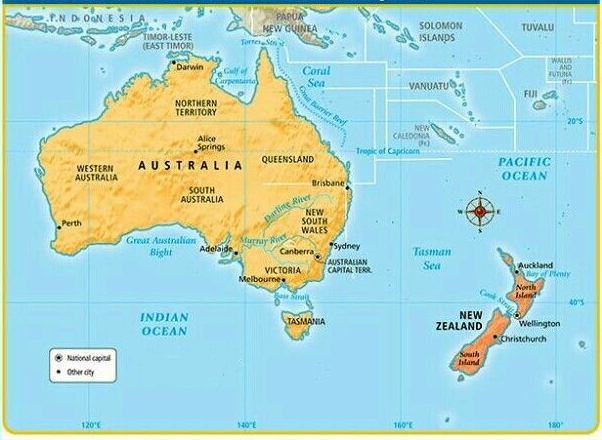International Relations
India-New Zealand Relations
- 15 Oct 2022
- 7 min read
For Prelims: QUAD, Supply Chain Resilience Initiative (SCRI), Indo-Pacific Region
For Mains: Strategic relations of India-Australia
Why in News?
Recently, External Affairs Minister (EAM) of India has visited New Zealand and Australia.
- The meeting consisted of various geo-political issues like how India-New Zealand contributions together will shape the larger region, the Indo-Pacific region. They also discussed the present security situation in the Indo-Pacific and also the consequences arising out of the Ukraine conflict.
What are the Different Aspects of India-New Zealand Relations?
- Historical Relations: India and New Zealand have a longstanding, friendly and growing relationship. Our ties go back to the 1800s, with Indians settling in Christchurch as early as the 1850s. Larger numbers of immigrants from Punjab and Gujarat came to New Zealand in the 1890s. Indian troops fought alongside the Anzacs in Gallipoli in 1915.
- Political Relations: India and New Zealand have cordial and friendly relations rooted in the linkages of the Commonwealth, parliamentary democracy, and the English language. Both countries became independent in the same year and diplomatic representation of India was established in 1950 with the opening of a Trade Commission, which was later upgraded to High Commission.
- Both countries are fellow travellers in their commitment to disarmament, global peace, North-South Dialogue, human rights, ecological preservation and combating international terrorism.
- Cooperation on the Covid-19 pandemic: Both countries cooperated extensively both bilaterally in fighting against the pandemic by ensuring the continuity of supply chains of essential commodities, medicines, and vaccines. Both countries also facilitated the repatriation of each other’s nationals stranded in the wake of Covid-19.
- Trade Relations: 11th largest two-way trading partner with total two-way trade valued at US$1.80 bn during 2020. Education and tourism are NZ’s growth sectors with India. Indian students numbering approximately 15000 (before the pandemic) are the 2nd largest source of international students for NZ.
- The number of Indian visitors to NZ in 2018 was the 9th largest at 67,953.
- India primarily imports logs and forestry products, wood pulp, wool, and edible fruit & nuts from NZ.
- Indian exports to NZ mostly are pharmaceuticals/medications, precious metals and gems, textiles and motor vehicles and non-knitted apparel and accessories.
- India shares Free Trade Agreements (FTAs) with New Zealand.
- Business Alliances: India NZ Business Council (INZBC) and India NZ Trade Alliance (INZTA) are the two prominent organizations working to promote India-NZ trade and investment relations.
- Cultural Relations: All Indian festivals including Diwali, Holi, Rakshabandhan, Baisakhi, Guruparv, Onam, Pongal, etc. are celebrated with much enthusiasm all over NZ. A set of four new stamps depicting the story of Diwali has been issued by New Zealand Post in 2021. NZ has approximately 2,50,000 persons of Indian origin & NRIs, a vast majority of which has made NZ their permanent home.
What are the Different Aspects of India-Australia Relations?
- Historical Relations: India and Australia established diplomatic relations in the pre-Independence period, with the establishment of India Trade Office in Sydney in 1941. The end of the Cold War and simultaneously India’s decision to launch major economic reforms in 1991 provided the first positive move towards development of closer ties between the two nations. With the passage of time, the relationship gained momentum towards a strategic relationship, alongside the existing economic engagement.
- India-Australia Strategic Relationship: With the changing global scenario, Australia has come to look at India as an important partner in promoting regional security and stability. This led to upgradation of bilateral relationship to a ‘Strategic Partnership’, including a Joint Declaration on Security Cooperation in 2009. Bilateral mechanisms include high level visits, Annual Meetings of Prime Ministers, Foreign Ministers’ Framework Dialogue, Joint Trade & Commerce Ministerial Commission, India-Australia '2+2' Foreign Secretaries and Defence Secretaries Dialogue, QUAD, Defence Policy Talks, Australia-India Education Council,etc.
- Trade Relations: Growing India-Australia economic and commercial relations contribute to the stability and strength of a rapidly diversifying and deepening bilateral relationship between the two countries.
- Australia is the 17th largest trading partner of India and India is Australia’s 9th largest trading partner.
- India-Australia bilateral trade for both merchandise and services is valued at USD 27.5 billion in 2021.
- India’s merchandise exports to Australia grew 135% between 2019 and 2021. India’s exports consist primarily of a broad-based basket largely of finished products and were USD 6.9 billion in 2021.
- India’s merchandise imports from Australia were USD 15.1 billion in 2021, consisting largely of raw materials, minerals and intermediate goods.
- India signed a historic trade agreement with Australia in 2022, the India-Australia Economic Cooperation and Trade Agreement (Ind- Aus ECTA).
- India and Australia are partners in the trilateral Supply Chain Resilience Initiative (SCRI) arrangement along with Japan which seeks to enhance the resilience of supply chains in the Indo-Pacific Region.
Way Forward
India’s strong economy, large population, and international influence make it a key partner in the Indo-Pacific region. Our relationship with the countries of the Indo-Pacific is a priority due to the increasing influence and assertiveness of China in the region. It also represents an enormous potential for India to emerge as a key leader in the region.
UPSC Civil Services Examination Previous Year Question (PYQ)
Q. Quadrilateral Security Dialogue (Quad) is transforming itself into a trade bloc from a military alliance, in present times Discuss. (2020)





